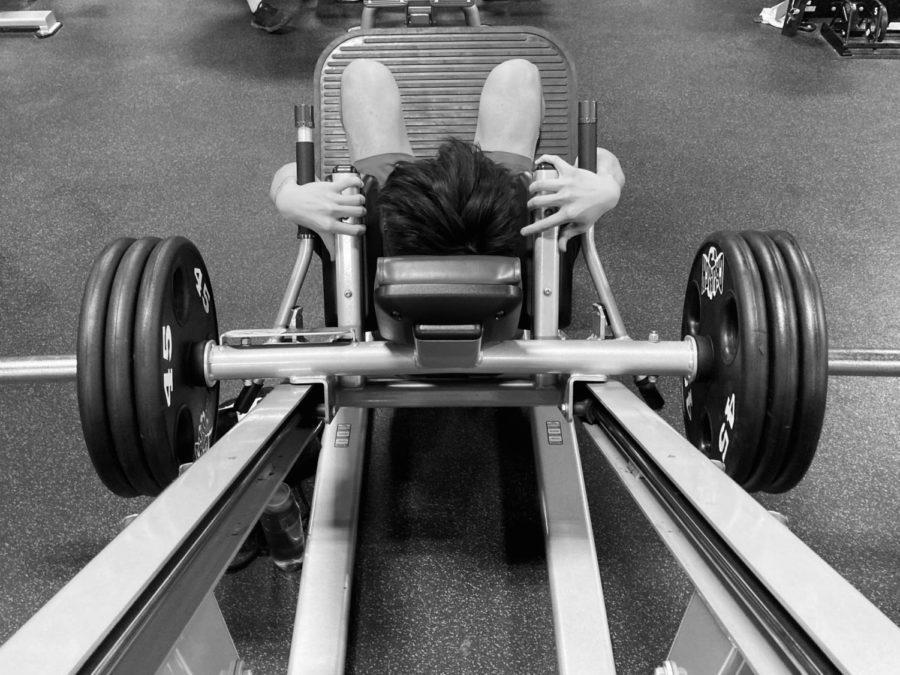Bigorexia
How Social Media Effects Teenage Gym Goers
Tate Franz 23′ hack squatting 270 pounds in order to get “legs like C-bum.”
When one is considering a change in their body shape or size, what do they do? Well, they most likely will hit the gym, an urge that has swept the nation over the past couple of years, seemingly spiking during the first months of the pandemic. The most affected by this? Teenagers.
As of 2021, the percentage of under 18-year-old gym goers has come up to 16.10% of the American gym-goers, which is a 69.8% increase from 2010, according to RunRepeat.
So why has this number increased so much? Well, when asking Tate Franz ‘23, and consistent gym user, claimed that he started his gym process because he “hated the way [he] looked” and how he felt about himself. Franz saw the gym as a way of improving his body and changing the perception of his body.
Yannick Long ‘23, who has been attending Crunch Fitness for a little over half a year, claims he started because he saw himself as “too skinny” and wanted to feel more “comfortable looking at [him]self in the mirror.” Now, a big inspiration for Long, because of their large size and extreme muscle mass, was the many TikTok “influencers” like C-bum, a fitness guru with nearly 2 million followers on the app.
Now, what many may not be considering is how social media -more specifically TikTok and Instagram- affects teenagers’ minds. The New York Times article “What is ‘Bigorexia’?” found that the relentless online glorification of muscular male bodies can have a toxic effect on the self-esteem of young men, with the “never-ending scroll of six-packs and boy-band faces making them feel inadequate and anxious.”
Some were not motivated by their interests as much as others. Ben Rosenberg, 24’ was told he had to “gain ten pounds” by his hockey coach, and he saw the easiest way to do this by going to the gym to achieve that goal. Social media “100 percent affects [his] perception of gym culture.” When he sees people that have extreme muscle mass, Rosenberg thinks to himself “damn, I wish I was that big.”
So, what exactly is Bigorexia? Well, as per Healthline it is defined as a body dysmorphic disorder that triggers a preoccupation that your body is too small or not muscular enough. The New York Times defines it as “feeling the need to look at yourself in the mirror every time you walk past it.” However, that may be an oversight.
Dante Winkler, 25’ has another perspective on why he and others should work out. He finds that it just helps his mental health and ultimately “makes [him] a better person.” When asked whether or not social media influences how he exercises and how he looks, Winkler claims it can help influence how you look at yourself and your exercises, but for him, he is “only influenced by it positively.”
But is this drastic urge to change truly healthy? Well, in most cases, yes, it is healthy, but the excessive obsession over how one looks in the mirror and comparing themselves to that of others whose bodies are most likely unattainable. Bigorexia can lead to depression and anger issues over how you look, and in serious cases, medication or steroid use related to physical fitness, as found by Healthline.
However, there are some positives to social media and its effects on those who go to the gym consistently. When asked if they believed whether or not social media affects their regime, Franz responded by saying, “Yes, it makes me do certain exercises that I wouldn’t have done before or even heard of.” Long responded, “Yes, it makes me understand movements and improve my form.”
Despite this, while social media does provide good information on how to properly do exercises or present new information, sometimes these videos and accounts can be spreading misinformation. In this case, it is on the user to be aware of this, and make sure to do their research. The internet is not always the most trustworthy source. Some are fighting against this, for example, JPG coaching, a fitness coach who takes these false exercises that others are spreading and shows why they are wrong, and how doing these exercises could negatively affect your body and growth.
Yes, working out and doing consistent exercises will improve your confidence, muscle growth and endurance. And yes, there are reliable ways to get your information and be good about going to the gym. However, be wary of Bigorexia and the false information that is being spread on social media.

Calvin Boykoff is a senior at Boulder High, entering his third year as a member of The Owl. This year, however, Calvin is entering into a leadership position and has taken upthe role of sports editor. Aside from writing and editing The Owl, Calvin enjoys video production and editing, which he sees as a career path he would like to pursue. He sees his future outside of the United States and is looking toward university in the United Kingdom or the Netherlands. In addition to his interest in media and video work, Calvin is a diehard soccer fan, playing for the varsity team this fall and supporting Chelsea Football Club. After every game or practice, Calvin loves to chow down on just about any food...







